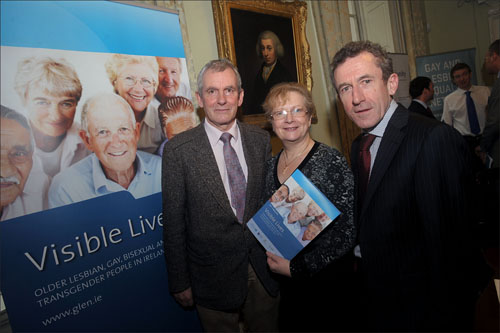Visible Lives Report on Older Lesbian, Gay, Bisexual and Transgender People Launched
Posted on: 09 November 2011
Ireland’s first research report on the lives of older lesbian, gay, bisexual and transgender (LGBT) people, Visible Lives, was launched recently in Dublin. Conducted by a team of researchers at Trinity College Dublin’s School of Nursing and Midwifery and led by Professor Agnes Higgins, the report’s findings are based on interviews and surveys of LGBT people, aged 55 and over living in Ireland.
The report, which was commissioned by GLEN and funded by the Get Vocal programme of Age & Opportunity and the HSE, acknowledge the huge progress that has been made in Ireland, but also shows past and continuing challenges faced by older LGBT people.

Eddie Parsons of GOLD, Agnes Higgins, of Trinity’s School of Nursing and Midwifery and Kieran Rose, Chair of GLEN.
Key findings include:
– Most older people surveyed went through the whole of their adolescence and their early adulthood without disclosing their sexual orientation or gender identity to anyone and without any contact with other LGBT people.
– Over a third (35%) still feel that friends will reject them if they tell them they about their sexual orientation or gender identity.
– Over a quarter (28%) had not disclosed their sexual orientation to any of their neighbours.
– One in ten had not disclosed their sexual orientation to any of their close family.
– 43% are single, which is much greater than the 15% for the entire over 55 population from the 2006 Census.
– 46% live alone which is much higher than the 26% for the entire over 65 population from the 2006 Census.
– Participants worry about isolation and loneliness as they age, particularly those living in rural areas and for those who have not come out.
– More than a quarter (26%) had not mentioned their sexual orientation to any of their healthcare providers and 22% would not reveal their LGBT identify to a health care practitioner for fear of a negative reaction.
– A major concern is that older age services and health care services will discriminate against them as LGBT people by not recognising or protecting their LGBT identity, and that they may not respect their partners in decision-making.
Speaking about the report, Professor Agnes Higgins said: “The findings of this study demonstrate the resilience of many LGBT people in overcoming adversity but clearly indicate the need for a cross-sectoral approach that supports positive ageing for older LGBT people. The findings also indicated the need for ensuring that national policies are inclusive of older LGBT people’s needs and that these policies are implemented in health and social care practices.”
